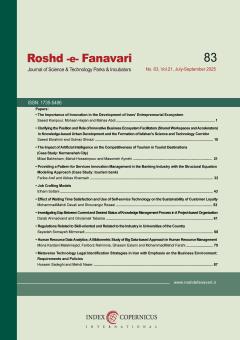Regulations Related to Skill-oriented and Related to the Industry in Universities of the Country
Subject Areas : زيرساختهاي توسعه فناوري و نهادهاي پشتيبان توسعه فناوري
1 -
Keywords: Industry, Internship, Co-op, Professor-Oriented, Skill-Oriented-Employability.,
Abstract :
The third generation of universities, often referred to as entrepreneurial universities, is expected to focus on education and training aligned with industry needs, while also enhancing graduates’ job-creating capabilities. In recent years, several regulations have been developed and communicated to universities by the Ministry of Science to support this goal. This article introduces and reviews regulations related to core skills and industry engagement in the country’s engineering fields, categorizing and comparing them into three main areas: (1) participation in short-term and long-term industry courses during the student period, (2) designing optional skill-based courses within students’ curricula, and (3) defining theses in accordance with industry needs. The first section examines internship courses, technical assistant regulations, industrial scholarships, and co-op programs, comparing their respective conditions. The second section discusses regulations aimed at improving undergraduate employability, including skill courses and associated requirements. The third section focuses on professor-oriented regulations supporting industry engagement.
1- کرمانی مهدی، نوغانی دخت بهمنی محسن، آسمانی فاطمه، برادران کاشانی زهرا. فوق برنامهها و جهتگیری کارآفرینانه در فرهنگ سازمانی دانشگاه؛ مطالعه موردی دانشگاه فردوسی مشهد. آموزش عالی ایران. ۱۳ (۳) :۱۰۱-۱۱۹، 1400.
2- حسان رضا، شریفزاده رحمان، کریمی المیرا. ارتباط صنعت و دانشگاه، بررسی و تحلیل ابزارهای سیاستی در قوانین و مقررات ایران، سیاستگذاری عمومی. 7 (2): 166-145، 1400.
3- حسان رضا، شریفزاده رحمان. طراحی آییننامه ارتقاء اعضای هیأتعلمی با هدف ارتقای ارتباط صنعت و دانشگاه. آموزش عالی ایران. ۱۴ (۴) :۱-۱۵، 1401.
4- ثقفی مهدی، بنیهاشمی سید علی، محمدزاده سیدعلیرضا، ارزیابی موانع ارتباط دانشگاه با صنعت در راستای تحقق اهداف برنامه ششم توسعه با استفاده از تحلیل عاملی تإییدی، نشریه صنعت و دانشگاه، (39) 11. 13-1، 1399.
5- آذر، عادل، غلامرضایی، داوود، داناییفرد، حسن، و خدادادحسینی، حمید. تحلیل پویای ارتباط صنعت و دانشگاه در خطمشیهای آموزش عالی برنامه پنجم توسعه با رویکرد پویایی سیستم. چشمانداز مدیریت صنعتی، 3 (9)، 79-115، 1392.
6- نظرزاده زارع, محسن, محمدی, شیرکوه, و نورالهی, سعید. ارزیابی سیاست وزارت علوم در ایجاد فرصت مطالعاتی اجباری ارتباط با صنعت از منظر نهادی. مدیریت و برنامهریزی در نظامهای آموزشی 16 (2)، 182-163، 1402.
7- فراستخواه، مقصود. بررسی الگوي تعاملات آموزش عالی و دانشگاه با ساير نظامهاي توليد و خدمات. فصلنامه پژوهش و برنامهريزي در آموزش عالی، 19و 41-24، 1389.
8- عیدی نسرین، نوریان محمد، جمشید مقدسی، سنتز پژوهی مؤلفههای دانشگاه نسل چهارم، دو ماهنامه علمی- پژوهشی رهیافتی نو در مدیریت آموزشی. 13 (6): 170-155، 1401.
9- توفیقی جعفر و نورشاهی نسرین. ارائه راهکارهایی برای توسعه همکاریهای دانشگاه و صنعت درایران، فصلنامه آموزش مهندسی ایران. 56 (14): 95-75، 1391.
10- صالحی عمران ابراهیم، رحمانی قهدریجانی الهه. مسأله اشتغال دانشآموختگان آموزش عالی و ضرورت توجه به مهارتهای اشتغالزای بازار کار در طرح آمایش آموزش عالی. آموزش عالی ایران. 5 (3). 27-58، 1392.
11- خیرالهی آسیه, نصر احمدرضا و میرشاه جعفری سیدابراهیم. شناسایی رویکردهای انتخاب موضوع پایاننامه و تهیه پیشنهاده و مقایسه آن در گروههای علوم انسانی، فنی و مهندسی و علوم پایه، مطالعات برنامهریزی آموزشی، 10 (19)، 59-39، 1400.
12- برنامه ششم توسعه، 1400-1396 ـ انتشارات سازمان برنامه و بودجه کشور
13- برنامه هفتم توسعه، 1407-1403 - انتشارات سازمان برنامه و بودجه کشور
14- آییننامه حمایت از تولید دانشبنیان و اشتغالآفرین در حوزه علوم، تحقیقات و فناوری - 5-6-1401
15- شیوهنامة اجرای آزمایشی توسعة بکارگیری دانشجویان مستعد تحصیلی در واحدهای اقتصادی کشور (طرح بورسیه صنعتی) – 5-2-1402 بنیاد ملی نخبگان
16- آییننامه طرح دستیار فناوری – 21 -12-1400 وزارت علوم
17- آییننامه ارتقای توان اشتغالپذیری دانشجویان دوره کارشناسی پیوسته – 21-9-1397 – وزارت علوم
18- شیوهنامه اجرای دروس مهارتی- اشتغالپذیری – 27-6-1402 - وزارت علوم
19- شیوهنامه پذیرش دانشجویان دورههای دکتری به روش استادمحور – 2-5-1401 – وزارت علوم
20- سامانه نظام ایدهها و نیازها (نان)
21- Santro, M. D. and A. K. Chakrabati. “Firm Size and Technology Centrality in Industry-University Interactions”, Mit ipc Working Paper ipc-01-001. 2010.
22- Streubert, H. J. and D. R. Carpenter. Qualitative Research in Nursing, Advancing Humanistic Imperative, 3 Philadelphia Lippincott, The UK, Science Policy Research Unit, University of Sussex, Brighton. 2009.
23- Merdith, S. and M. Burkle. “Building Bridges Between University and Industry: Theory and Practice”, Education and Training, 50 (3). 2012.
24- Filippetti, Andrea; & Savona, Maria. J. University–industry linkages and academic engagements: individual behaviors and firms’ barriers. Introduction to the special section Technol Transfr. 2017.
25- Faiz, Ali; & Shahabi, Ali. Evaluating and prioritizing the barriers of communication between university and industry (case study of Semnan city). Educational Leadership and Management Quarterly. 4(2), 124-97. 2010.
26- Afonso, A., Ramirez, J., Diaz Puente, J.M. University- industry cooperation in the education domain to foster competitiveness and employment, Procedia - Social and Behavioral Sciences, 46, pp. 3947-3953. 2012.
27- Olasky, J., Kim, M., Muratore, S., Zhang, E., Fitzgibbons, S.C., Cambell, A., & Acton, R. ACS/ASE Medical Student Simulation- Based Skills Curriculum Study: Implementation Phase, Journal of Surgical Education, 76 (4), 262 – 269. 2019.
28- Chan, C.K.Y., Fong, E.T.Y., Luk, L.Y.Y., & Ho, R. A review of literature on challenges in the development and implementation of generic competencies in higher education curriculum, International Journal of Educational Development, 57, 1 – 10. 2017.
29- Roaal, D. Complementary skills training for researchers at all career stages., Journal of Accounting and Economics, No. 60, Pp. 74- 92. 2018.
30- Aygoren, F. E., & Kemal, O. New Approach at Evaluating the Private Schools' Curriculum: I-CODE Model. Turkish Online Journal of Educational Technology - TOJET, 18 (2), 58-81. 2019.

